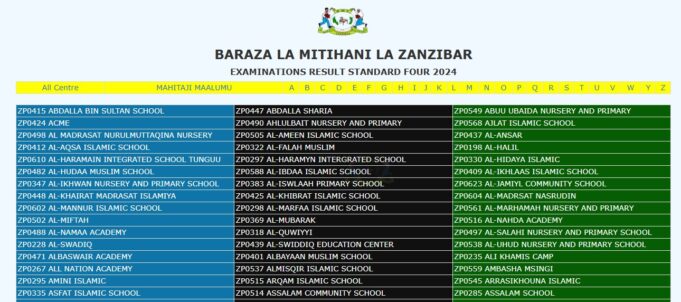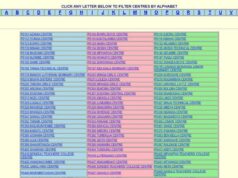Standard Four Results |SFNA Results| Matokeo ya DARASA LA NNE 2023/2024
The Ministry of Education and Vocational Training (MoEVT) has been organizing examinations since 1964. Initially, it oversaw Standard VIII exams to determine progression to secondary school, while the Cambridge School Examinations were used for secondary education. In 1969, the Form II Examinations were introduced to select students advancing to Form III after completing the first cycle of secondary education. This system remained until 1972. By 1973, students completing the first cycle sat for exams at the Form III level to finalize that stage of education.
Matokeo ya Mtihani wa Darasa la Nne Zanzibar kwa mwaka 2024/2025 yametangazwa rasmi. Ili kuona matokeo yako, tafadhali tembelea tovuti rasmi ya Baraza la Mitihani Zanzibar (BMZ) kupitia kiungo hiki:
STANDARD FOUR RESULTS LINK
Hatua za kufuata ili kuangalia matokeo yako:
- Fungua tovuti ya BMZ: https://bmz.go.tz/.
- Katika ukurasa wa mwanzo, tafuta na ubofye sehemu iliyoandikwa “Matokeo ya Darasa la Nne”.
- Chagua mwaka wa mtihani, yaani “2024/2025”.
- Tafuta jina la shule yako kwenye orodha itakayoonekana na ubofye juu yake.
- Orodha ya wanafunzi na matokeo yao itaonekana; tafuta jina lako ili kuona matokeo yako binafsi.
- Inashauriwa kupakua na kuchapisha nakala ya matokeo yako kwa ajili ya kumbukumbu za baadaye.
As a nation, the release of Standard Four examination results presents an opportunity to strengthen the education system and support students’ growth. Here’s what can be done:
- Evaluate Education Policies
Analyze overall performance to assess the effectiveness of teaching methods, curricula, and resource allocation. Use the data to improve policies and address gaps in the education system. - Support Underperforming Regions
Identify regions or schools with lower performance and allocate resources, such as teacher training, additional learning materials, or infrastructure development, to bridge the gap. - Encourage Teacher Development
Invest in continuous professional development programs for teachers to enhance their skills and knowledge, ensuring better classroom outcomes. - Engage Parents and Communities
Promote parental and community involvement in education by raising awareness about the importance of supporting children’s learning at home and in school. - Strengthen Monitoring and Evaluation
Establish robust systems for monitoring students’ progress and identifying challenges early, enabling timely interventions. - Promote Equity in Education
Ensure all children, regardless of their socioeconomic background or geographic location, have access to quality education and equal opportunities to succeed. - Foster Holistic Development
Beyond academics, encourage programs that support physical, emotional, and social growth, preparing students for future challenges. - Celebrate Success
Recognize and reward outstanding performance at both individual and school levels to motivate students and educators while fostering a culture of excellence.
By taking these actions, the nation can create an education system that supports all students’ potential and contributes to long-term national development.




